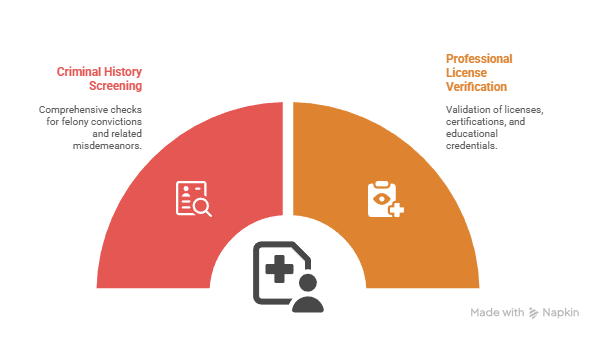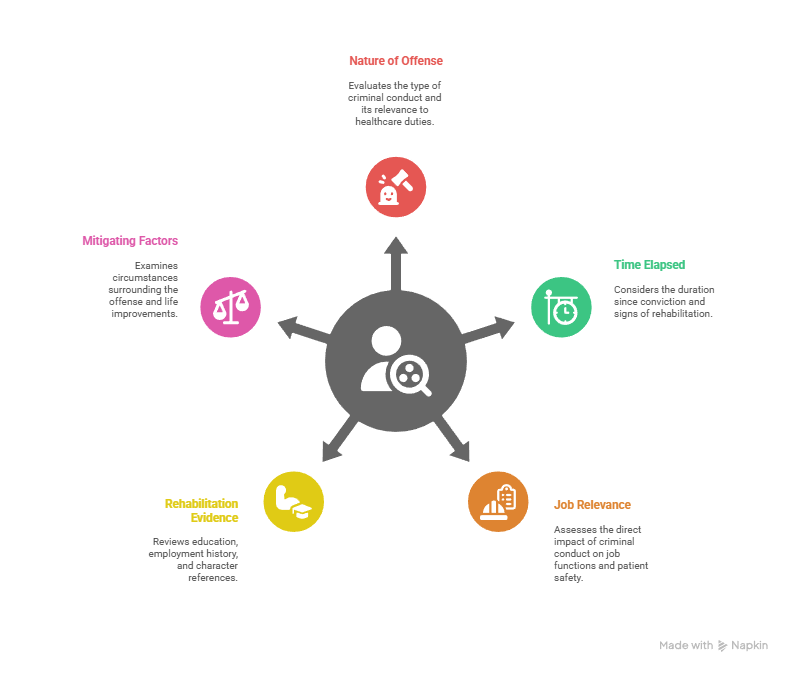Texas healthcare background check requirements mandate comprehensive criminal history reviews, drug screenings, and credential verifications for healthcare workers across hospitals, clinics, and long-term care facilities. Healthcare employers must comply with state-specific regulations while following federal FCRA guidelines to ensure patient safety and regulatory compliance.
Key Takeaways
- Texas healthcare facilities must conduct thorough background screenings including criminal history, sex offender registry checks, and employment verification for all healthcare workers
- The Texas Health and Safety Code requires specific background check components for different healthcare settings, with stricter requirements for long-term care facilities
- Healthcare employers must comply with both Texas state regulations and federal FCRA requirements when conducting employee background screenings
- Certain criminal convictions create automatic disqualifications for healthcare positions, while others require individual assessment based on job relevance and rehabilitation evidence
- Drug testing and ongoing monitoring programs are mandatory for healthcare workers in most Texas facilities, with specific protocols for prescription drug use
- Background check results must be properly documented and maintained according to Texas healthcare compliance standards and HIPAA privacy requirements
Understanding Texas Healthcare Background Check Laws
Texas healthcare background check requirements operate under a comprehensive regulatory framework designed to protect patients and maintain healthcare facility standards. The Texas Health and Safety Code, along with federal regulations, establishes mandatory screening protocols for healthcare workers across various settings. Healthcare employers must navigate both state-specific requirements and federal compliance standards to ensure proper hiring practices.
The regulatory landscape includes multiple oversight agencies with distinct requirements. The Texas Department of Health and Human Services oversees long-term care facility screenings, while the Texas Medical Board regulates licensed healthcare professionals. Additionally, facilities receiving federal funding must comply with Centers for Medicare & Medicaid Services (CMS) background check requirements, creating layered compliance obligations for most healthcare employers.
Understanding these regulations is crucial for HR professionals and hiring managers in Texas healthcare facilities. Non-compliance can result in significant penalties, including facility licensing issues, federal funding loss, and legal liability. Healthcare employers must implement comprehensive background screening programs that meet or exceed minimum regulatory requirements while respecting applicant rights under fair hiring practices.
Required Background Check Components for Healthcare Workers

Criminal History Screening Requirements
Texas healthcare facilities must conduct comprehensive criminal background checks covering multiple jurisdictions and timeframes. State law requires screening for felony convictions, certain misdemeanors related to patient care, and pending criminal charges that could impact job performance. The screening process must include county, state, and federal criminal record searches to ensure complete coverage of an applicant's criminal history.
Healthcare employers must pay special attention to crimes involving violence, theft, fraud, or substance abuse when evaluating criminal records. Texas regulations specify that certain convictions create automatic disqualifications, while others require individualized assessment based on the nature of the offense, time elapsed since conviction, and evidence of rehabilitation. This approach balances patient safety concerns with fair hiring practices for individuals with criminal histories.
Professional License and Credential Verification
Healthcare background checks in Texas must include thorough verification of all professional licenses, certifications, and educational credentials. This process involves confirming current license status, checking for disciplinary actions, and verifying educational qualifications from accredited institutions. Healthcare employers must validate credentials with issuing bodies rather than relying solely on applicant-provided documentation.
The verification process extends beyond basic license confirmation to include checking for sanctions or restrictions that might impact job performance. Healthcare facilities must also verify specialty certifications, continuing education compliance, and any additional credentials required for specific positions. This comprehensive approach ensures that healthcare workers possess the necessary qualifications and maintain good standing with professional regulatory bodies.
Healthcare Facility-Specific Requirements

Different types of healthcare facilities in Texas face varying background check requirements based on their patient populations and regulatory oversight. Long-term care facilities operate under the most stringent requirements due to vulnerable patient populations, while outpatient clinics may have more flexible screening protocols. Understanding these differences helps healthcare employers implement appropriate background screening programs for their specific facility type.
Hospitals and acute care facilities must comply with multiple regulatory frameworks, including state health department requirements and federal Medicare/Medicaid participation standards. These facilities typically require comprehensive background checks for all patient-facing positions, with additional screening requirements for employees accessing controlled substances or sensitive patient information. The screening process often includes ongoing monitoring obligations to ensure continued compliance throughout employment.
Long-Term Care Facility Requirements
Texas long-term care facilities face the most comprehensive background check requirements in the healthcare sector. These facilities must screen all employees, contractors, and volunteers who have direct patient contact or access to patient living areas. The screening process includes criminal background checks, sex offender registry searches, and abuse registry checks at both state and federal levels.
| Screening Component | Required Frequency | Regulatory Authority |
| Criminal Background Check | Pre-employment + Every 4 years | Texas HHSC |
| Sex Offender Registry | Pre-employment + Annually | Department of Public Safety |
| Nurse Aide Registry | Pre-employment + Upon renewal | Texas HHSC |
| Employee Misconduct Registry | Pre-employment + Upon incident | CMS/Texas HHSC |
Long-term care facilities must also implement ongoing monitoring programs to identify employees who may become disqualified due to subsequent criminal activity or regulatory violations. This creates ongoing compliance obligations that extend well beyond initial hiring decisions and require robust record-keeping systems to track screening requirements and renewal dates.
Drug Testing and Substance Abuse Screening
Mandatory Drug Testing Programs
Texas healthcare facilities must implement comprehensive drug testing programs that include pre-employment screening, random testing, and post-incident protocols. Healthcare workers in safety-sensitive positions face particular scrutiny due to patient safety concerns and access to controlled substances. The drug testing process must follow federal DOT guidelines where applicable and comply with Texas workplace drug testing laws.
- Pre-employment screening: Mandatory drug testing for all new healthcare hires before beginning patient care duties
- Random testing programs: Ongoing random drug screening for employees in safety-sensitive positions throughout employment
- Post-incident protocols: Required testing following workplace accidents, medication errors, or patient safety incidents
- Reasonable suspicion testing: Testing based on observable signs of impairment or policy violations
- Return-to-duty evaluations: Comprehensive testing and evaluation for employees returning after substance abuse violations
- Prescription drug policies: Clear procedures for employees requiring controlled substances for legitimate medical purposes
- Medical review officer oversight: Professional evaluation of positive results and medical explanations
- ADA accommodations: Proper procedures for employees with disabilities requiring prescription medications
- Documentation requirements: Secure record-keeping and confidential handling of all drug testing results
Healthcare facilities must balance patient safety requirements with employee rights, ensuring that drug testing policies are consistently applied and legally defensible. Regular policy updates reflect changing regulations and best practices in healthcare substance abuse prevention.
Prescription Drug Monitoring Requirements
Healthcare workers who prescribe, dispense, or have access to controlled substances face additional monitoring requirements under Texas law. The Texas Prescription Monitoring Program (PMP) provides oversight of controlled substance prescribing and dispensing activities, requiring healthcare facilities to implement appropriate oversight mechanisms. These requirements extend to background screening for positions with controlled substance access.
Healthcare employers must verify that applicants for positions involving controlled substances have not been sanctioned by the Drug Enforcement Administration or state regulatory bodies. This screening includes checking the National Practitioner Data Bank, state licensing board records, and federal exclusion lists. Ongoing monitoring ensures that employees maintain eligibility to handle controlled substances throughout their employment tenure.
FCRA Compliance in Healthcare Background Screening
Healthcare employers in Texas must comply with federal Fair Credit Reporting Act requirements when conducting background checks through third-party screening companies. FCRA compliance involves specific notice and consent procedures, adverse action protocols, and record-keeping requirements that protect applicant rights while enabling thorough screening processes. Healthcare facilities must ensure their screening procedures meet FCRA standards to avoid legal liability and maintain compliance with federal regulations.
The FCRA requires healthcare employers to provide clear disclosure of background screening activities and obtain written consent before conducting checks. If adverse employment decisions result from background check findings, employers must follow specific notification procedures including providing copies of screening reports and notices of applicant rights. These requirements apply regardless of whether the healthcare facility conducts screening internally or through third-party providers.
Healthcare employers must also consider state-specific background screening laws that may provide additional protections for job applicants. Texas has implemented certain restrictions on criminal history inquiries that complement federal FCRA requirements, creating a comprehensive legal framework for fair and compliant background screening practices. Regular training for HR professionals ensures consistent application of these requirements across all hiring decisions.
Criminal History Evaluation and Fair Chance Hiring
Individualized Assessment Requirements
Texas healthcare employers must conduct individualized assessments when criminal history information could impact hiring decisions, balancing patient safety concerns with fair hiring practices. The assessment process considers factors such as the nature and gravity of the offense, time elapsed since conviction, and evidence of rehabilitation or good conduct. Healthcare facilities must document their evaluation process to demonstrate compliance with fair hiring requirements and defend against potential discrimination claims.
The individualized assessment should include consideration of job-specific requirements and the relationship between criminal conduct and job responsibilities. For example, financial crimes may be more relevant for positions involving billing or cash handling, while violent offenses require careful evaluation for any patient-facing role. Healthcare employers must avoid blanket exclusion policies that could violate fair hiring requirements while maintaining appropriate patient safety standards.

- Nature of the offense: Evaluate the specific criminal conduct and its relationship to healthcare job duties
- Time elapsed: Consider the time period since conviction and evidence of rehabilitation during that period
- Job relevance: Assess whether the criminal conduct directly relates to essential job functions and patient safety
- Rehabilitation evidence: Review evidence of rehabilitation, education, employment history, and character references
- Mitigating factors: Consider circumstances surrounding the offense and subsequent life changes or improvements
Healthcare employers should provide applicants with opportunities to provide additional information or context regarding criminal history findings. This process respects applicant rights while enabling informed hiring decisions based on complete information rather than criminal records alone.
Ongoing Monitoring and Compliance Maintenance
Healthcare facilities in Texas must implement ongoing monitoring systems to ensure continued compliance with background check requirements throughout the employment relationship. These systems track license renewals, monitor for subsequent criminal activity, and ensure compliance with continuing education requirements. Ongoing monitoring helps healthcare employers identify potential compliance issues before they impact patient care or regulatory standing.
The monitoring process should include regular license verification, periodic criminal background updates, and tracking of any disciplinary actions or sanctions affecting healthcare workers. Many healthcare facilities implement automated systems that provide alerts for license expiration, disciplinary actions, or other compliance issues. These systems help maintain current information on all healthcare workers and ensure timely responses to potential compliance concerns.
Healthcare employers must also maintain comprehensive documentation of all background screening activities, including initial checks, ongoing monitoring results, and any adverse action decisions. This documentation serves as evidence of compliance with regulatory requirements and provides protection in case of audits or legal challenges. Proper record retention policies ensure that documentation remains available for required time periods while protecting employee privacy and confidential information.
Best Practices for Healthcare Employers
Healthcare employers should develop comprehensive background screening policies that exceed minimum regulatory requirements while respecting applicant rights and promoting fair hiring practices. These policies should clearly outline screening procedures, evaluation criteria, and appeal processes for adverse decisions. Regular policy review ensures alignment with changing regulations and industry best practices in healthcare background screening.
Staff training programs help ensure consistent application of background screening requirements across all hiring decisions. HR professionals, hiring managers, and other staff involved in the screening process should receive regular training on legal requirements, evaluation procedures, and documentation standards. This training helps prevent compliance violations and ensures that all healthcare workers understand their roles in maintaining facility compliance with background screening requirements.
| Best Practice Area | Implementation Strategy | Compliance Benefit |
| Policy Development | Regular legal review and updates | Ensures current compliance |
| Staff Training | Quarterly compliance education | Reduces screening errors |
| Documentation | Standardized record-keeping | Supports audit preparation |
| Vendor Management | Regular screening company audits | Maintains FCRA compliance |
| Technology Integration | Automated monitoring systems | Improves ongoing compliance |
Healthcare facilities should also establish relationships with qualified screening vendors who understand healthcare industry requirements and maintain appropriate certifications and insurance coverage. Vendor oversight includes regular performance reviews, compliance audits, and contract updates that reflect changing regulatory requirements. These partnerships help healthcare employers access specialized expertise while maintaining compliance with complex background screening regulations.
Conclusion
Texas healthcare background check requirements represent a complex regulatory landscape that healthcare employers must navigate carefully to ensure patient safety and legal compliance. Understanding state-specific requirements, federal FCRA obligations, and industry best practices enables healthcare facilities to implement effective screening programs that protect patients while respecting applicant rights. Regular policy review, staff training, and ongoing monitoring systems help maintain compliance with evolving regulations and support high-quality patient care. Healthcare employers who invest in comprehensive background screening programs position themselves for regulatory success while building strong, qualified healthcare teams that serve Texas communities effectively.
Frequently Asked Questions
What types of criminal convictions automatically disqualify someone from healthcare employment in Texas?
Texas law creates automatic disqualifications for certain serious offenses including murder, sexual assault, injury to a child or elderly person, and abandoning or endangering a child. Other convictions require individualized assessment based on job relevance, time elapsed, and rehabilitation evidence.
How often must healthcare facilities in Texas repeat background checks for existing employees?
Long-term care facilities must repeat criminal background checks every four years for existing employees, while sex offender registry checks are required annually. Other healthcare facilities may have different requirements based on their specific regulatory oversight and internal policies.
Are healthcare employers in Texas required to use specific background screening companies?
No, Texas does not mandate specific screening vendors, but healthcare employers must ensure their chosen providers comply with FCRA requirements and can access all required databases including state criminal records, sex offender registries, and professional licensing boards.
Can healthcare workers in Texas be employed while their background check is pending?
Some healthcare facilities may allow conditional employment pending background check completion, but this practice varies by facility policy and position type. Long-term care facilities have stricter requirements that generally prohibit patient contact until screening is complete.
What happens if a healthcare worker's license expires or is suspended after employment begins?
Healthcare facilities must immediately remove workers from duties requiring valid licensure if their license expires or faces suspension. The facility's ongoing monitoring system should identify these issues promptly to ensure compliance and patient safety.
Do volunteer workers in Texas healthcare facilities need background checks?
Yes, volunteers who have patient contact or access to patient areas typically require the same background screening as paid employees, particularly in long-term care facilities where volunteers must complete full background check requirements.
How long must healthcare facilities retain background check documentation in Texas?
Healthcare facilities should retain background check documentation for at least seven years after employment ends, though some regulatory requirements may specify longer retention periods. Proper documentation supports compliance audits and legal defense if needed.
Can healthcare applicants dispute or appeal background check findings in Texas?
Yes, applicants have FCRA rights to dispute inaccurate information and request individualized assessment of criminal history findings. Healthcare employers must provide proper notice of adverse actions and opportunities for applicants to provide additional information or context.
Additional Resources
- Texas Health and Safety Code - Healthcare Facility Licensing Requirements
https://statutes.capitol.texas.gov/Docs/HS/htm/HS.142.htm - Texas Department of Health and Human Services - Background Check Requirements
https://www.hhs.texas.gov/providers/long-term-care-providers/nursing-facilities-nf/background-checks - Federal Trade Commission - FCRA Compliance Guide
https://www.ftc.gov/business-guidance/resources/using-consumer-reports-what-landlords-need-know - Equal Employment Opportunity Commission - Background Check Guidance
https://www.eeoc.gov/newsroom/eeoc-issues-enforcement-guidance-consideration-arrest-and-conviction-records-employment - Texas Medical Board - License Verification System
https://www.tmb.state.tx.us/page/look-up-a-license - National Practitioner Data Bank - Healthcare Provider Screening
https://www.npdb.hrsa.gov/ - Texas Department of Public Safety - Sex Offender Registration Program
https://records.txdps.state.tx.us/SexOffenderRegistry
Still have questions?
Get in touch with our team today for a personalized demo and discover how our tailored volume pricing and packages can drive results for your business!
How useful was this page?*
Note: your comments are anonymous. We use them to improve the website. Do not include any personal details.
Visit our FCRA Compliance Tool or leave a message here if you need a response.
From the blog Explore the GCheck Content Hub

Healthcare Background Screening Costs: 2026 Budget Planning Guide for Medical Facilities
30 Dec, 2025 • 23 min read
FACIS Background Check: 2026 Healthcare Compliance Guide
18 Dec, 2025 • 20 min read
Food Delivery Driver Background Check: Complete Compliance Guide for Restaurant Operators
17 Dec, 2025 • 17 min readThe information provided in this article is for general informational and educational purposes only and should not be construed as legal advice or a substitute for consultation with qualified legal counsel. While we strive to ensure accuracy, employment screening laws and regulations—including but not limited to the Fair Credit Reporting Act (FCRA), Equal Employment Opportunity Commission (EEOC) guidelines, state and local ban-the-box laws, industry-specific requirements, and other applicable federal, state, and local statutes—are subject to frequent changes, varying interpretations, and jurisdiction-specific applications that may affect their implementation in your organization. Employers and screening decision-makers are solely responsible for ensuring their background check policies, procedures, and practices comply with all applicable laws and regulations relevant to their specific industry, location, and circumstances. We strongly recommend consulting with qualified employment law attorneys and compliance professionals before making hiring, tenant screening, or other decisions based on background check information.

